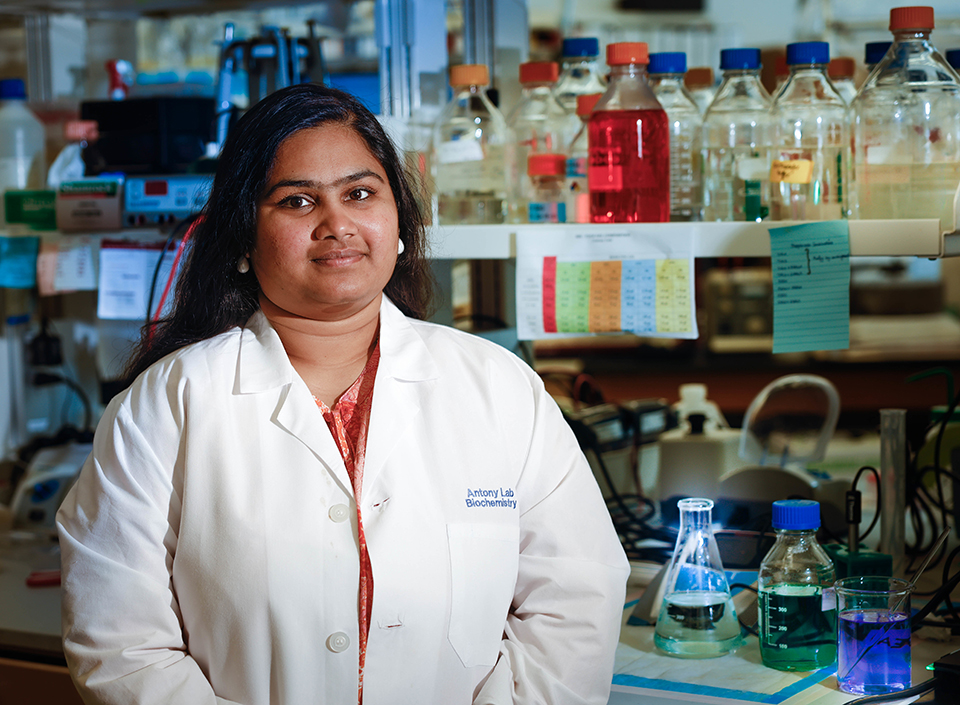SLU School of Medicine Grad Student Wins National Cancer Institute Award
ST. LOUIS — Sahiti Kuppa, a graduate student at the Saint Louis University School of Medicine, has received a high-profile award from the National Cancer Institute (NCI). This is the first time a SLU student has received the award.
"Kuppa is one of only 25 students in the nation to receive the competitive award this year," said Edwin Antony, Ph.D., professor of biochemistry and molecular biology, whose research focuses on understanding the mechanism of how proteins function in response to DNA damage and carcinogenesis. “It’s a testament to the excellent educational and training opportunities students receive at Saint Louis University and the SLU School of Medicine.”
The NCI’s Predoctoral to Postdoctoral Fellow Transition (F99/K00) Award supports outstanding Ph.D. and other research doctoral candidates as they complete their dissertation research training and transition to mentored, cancer-focused postdoctoral career development research positions.
The purpose of the award is to encourage and retain outstanding graduate students recognized by their institutions for their high potential and strong interest in pursuing careers as independent cancer researchers.
"Even with great ideas, being an international student restricts my access to 90% of the grants available,” Kuppa said. “The NCI F99/K00 is one of the few grants available to international students. It is an honor and privilege to be a part of this grant.”
The NCI is piloting this new funding program to explore innovative ideas to address the significant imbalances between the numbers of biomedical trainees and the available tenure track positions and between the numbers of biomedical researchers and available research grants.
“The combined F99 and K00 training phases will provide me with the necessary skills towards an independent research career focused on understanding multiple mechanisms that alter carcinogenesis,” Kuppa said.
Kuppa's Research
The award supports Kuppa’s research in understanding the interplay between genomic instability and associated cancers. Her doctoral work centers around understanding the dynamic nature of an essential DNA repair protein called replication protein A (RPA) and its functions.
“Genomic insults happen almost all the time, and these often lead to cancers,” Kuppa said. “Our cells have a machinery of proteins that extensively help repair this DNA and preserve genomic stability.”
The DNA damage response is a signaling cascade that responds to breaks in the DNA and utilizes an array of DNA repair factors to correct the error and preserve genomic integrity. The DNA repair factors regulate cell cycle and signaling processes that either trigger DNA repair or programmed cell death. Upon DNA damage, DNA repair factors are shuttled into the nucleus.
Kuppa’s research training focuses on regulating RPA by chaperone-like proteins. Kuppa says RPA is an essential single-stranded DNA (ssDNA) binding protein that regulates multiple aspects of DNA metabolism, including DNA replication, repair, and recombination. RPA is transported into the nucleus, recognizes and binds ssDNA, and activates numerous checkpoint responses and signaling cascades by interacting with over three dozen RPA-interacting proteins (RIPs).
“DNA repair proteins are known to have altering functions during carcinogenesis. This makes the DDR factor interesting and targets for cancer therapeutics,” Kuppa said. “My work specifically focuses on understanding how DNA repair factors are controlled through chaperones, especially in cancers”
Kuppa says she has uncovered a novel phenomenon of how a chaperone protein called Regulator of Ty1 transposition 105 (Rtt105) regulates RPA. Using sophisticated biophysical, biochemical, and structural tools, Kuppa shows that ssDNA binds to the RPA-Rtt105 complex and removes the restraints to promote the recruitment of DDR factors. In higher eukaryotes, a protein called RPA-interacting protein (RPAIN) serves as the functional ortholog of Rtt105, and she will focus on deciphering its mechanism of action.
In addition, using cryoEM, she will determine the structures of RPA bound to these chaperone-like proteins. In the K00 part of the proposal, she will focus on identifying chaperone-like proteins specific to other cancer-related DDR proteins. She will investigate the regulatory and signaling mechanisms that control the nuclear-cytoplasmic transport mechanism of DDR factors during DNA damage and cancers.
“Throughout my submission of the grant, I have received tremendous support,” Kuppa said. “This wouldn't be possible without my mentor Dr. Edwin Antony who encouraged me to apply and never let me stop with mediocre."
Saint Louis University School of Medicine
Established in 1836, Saint Louis University School of Medicine has the distinction of awarding the first medical degree west of the Mississippi River. The school educates physicians and biomedical scientists, conducts medical research, and provides health care on a local, national and international level. Research at the school seeks new cures and treatments in five key areas: cancer, liver disease, heart/lung disease, aging and brain disease, and infectious diseases.



















